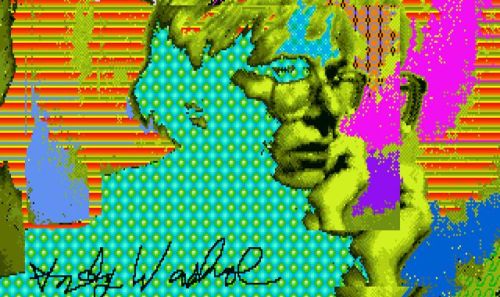"Andy2" by Andy Warhol, 1985.
©The Andy Warhol Foundation for the Visual Arts, Inc., courtesy of The Andy Warhol Museum
A multi-institutional team of new-media artists, computer experts, and museum professionals have discovered twenty-eight never-before-seen digital images from a dozen previously unknown experiments by Andy Warhol (BFA, 1949) on aging floppy disks from 1985. The purely digital images, “trapped” for nearly 30 years on Amiga® floppy disks stored in the archives collection of The Andy Warhol Museum (AWM), were discovered and extracted by members of the Carnegie Mellon University (CMU) Computer Club, with assistance from the AWM’s staff, CMU’s Frank-Ratchye STUDIO for Creative Inquiry (FRSCI), the Hillman Photography Initiative at the Carnegie Museum of Art (CMOA), and New York based artist Cory Arcangel.
Warhol’s Amiga experiments were the products of a commission by Commodore International to demonstrate the graphic arts capabilities of the Amiga 1000 personal computer. Created by Warhol on prototype Amiga hardware in his unmistakable visual style, the recovered images reveal an early exploration of the visual potential of software imaging tools, and show new ways in which the preeminent American artist of the 20th century was years ahead of his time.
The works were only discovered, however, because artist Cory Arcangel remembered seeing the disks in Warhol’s studio in 1991 and asked Matt Wrbican, chief archivist at The Warhol, to look for the them. “In the images we see a mature artist who had spent about 50 years developing a specific hand-to-eye coordination now suddenly grappling with the bizarre new sensation of a mouse in his palm held several inches from the screen,” Wrbican told the Telegraph. “No doubt he resisted the urge to physically touch the screen — it had to be enormously frustrating, but it also marked a huge transformation in our culture: the dawn of the new era of affordable home computing. We can only wonder how he would explore and exploit the technologies that are so ubiquitous today.”
Warhol’s Amiga experiments were the products of a commission by Commodore International to demonstrate the graphic arts capabilities of the Amiga 1000 personal computer. Created by Warhol on prototype Amiga hardware in his unmistakable visual style, the recovered images reveal an early exploration of the visual potential of software imaging tools, and show new ways in which the preeminent American artist of the 20th century was years ahead of his time.
The works were only discovered, however, because artist Cory Arcangel remembered seeing the disks in Warhol’s studio in 1991 and asked Matt Wrbican, chief archivist at The Warhol, to look for the them. “In the images we see a mature artist who had spent about 50 years developing a specific hand-to-eye coordination now suddenly grappling with the bizarre new sensation of a mouse in his palm held several inches from the screen,” Wrbican told the Telegraph. “No doubt he resisted the urge to physically touch the screen — it had to be enormously frustrating, but it also marked a huge transformation in our culture: the dawn of the new era of affordable home computing. We can only wonder how he would explore and exploit the technologies that are so ubiquitous today.”

No comments:
Post a Comment